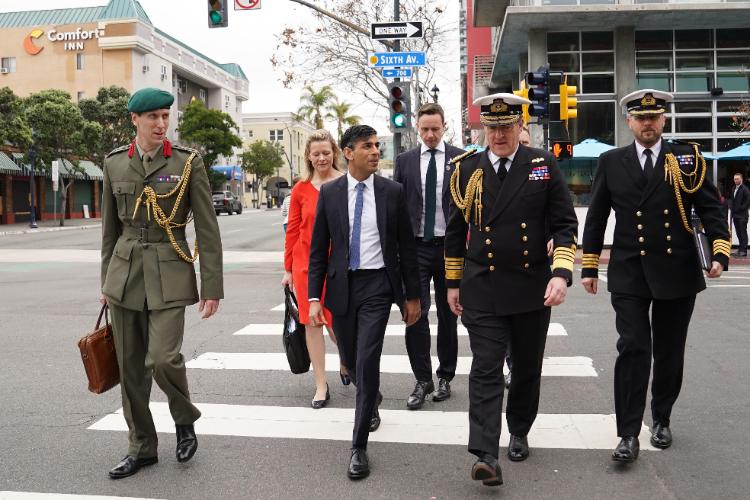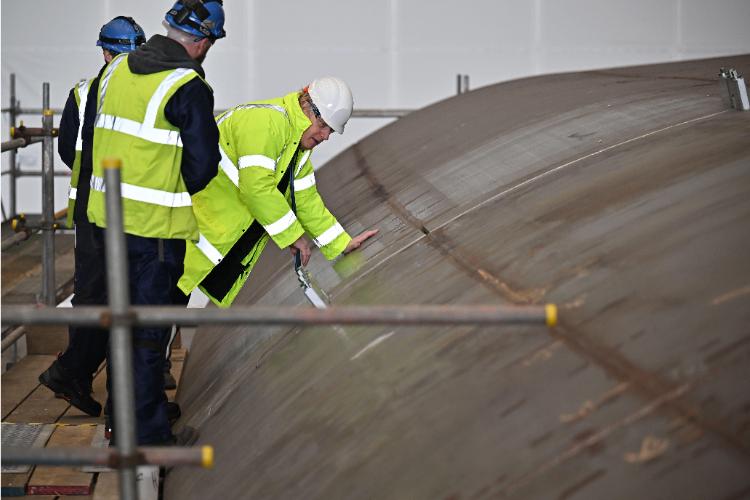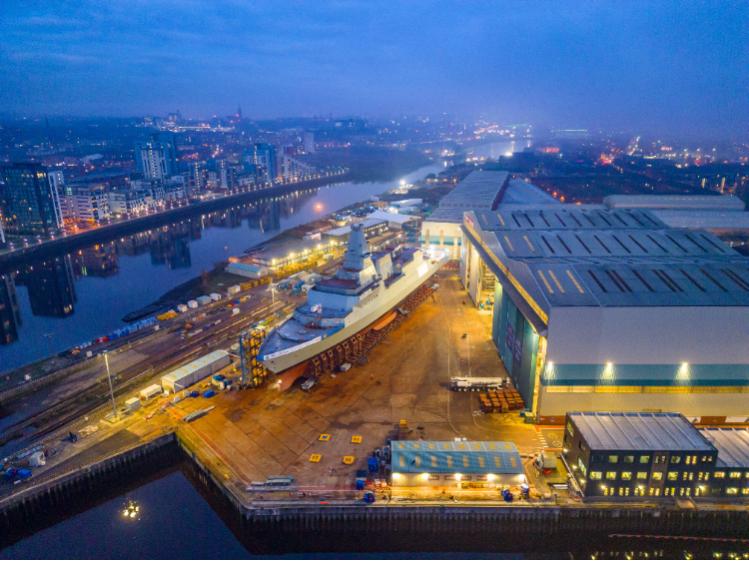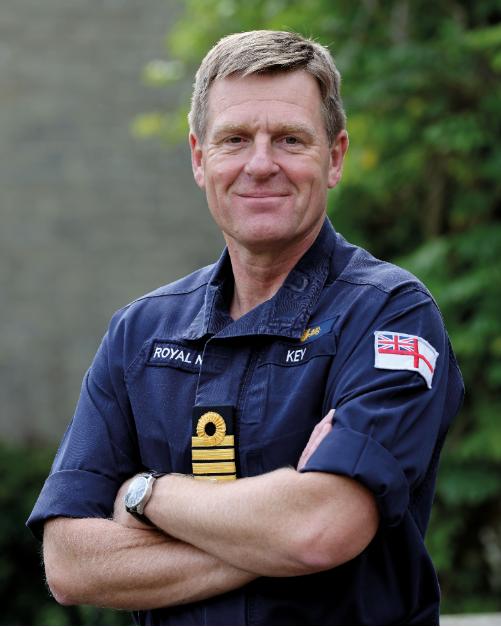"We are effectively in a war for talent in this country": The First Sea Lord interview
First Sea Lord Admiral Sir Ben Key (Credit: Associated Press / Alamy Stock Photo)
7 min read
The First Sea Lord Admiral Sir Ben Key says it is a fascinating time to be part of the Royal Navy. With a need to grow, but recruitment proving challenging, he speaks with Sophie Church about the Navy’s plans to appeal to jobseekers, the changing world order and modernising the service
Sitting in his Ministry of Defence office – a cannonball propping open the door – the First Sea Lord Admiral Sir Ben Key reflects on the changes the Royal Navy is going through.
“The Navy that I joined was 75,000 people, there or there abouts, with the reserves and the civilians. Now we are about 36,000 with regular reserves and civilians. And so…it is a much smaller world; the number of frigates has reduced considerably.”
But now, the Admiral says this shrinking trend must be reversed. “For the first time since the end of the Second World War, we have got to get bigger. And that is not in our DNA; we have had 80 years of effectively getting smaller.”
We need to be ready to engage with China anywhere in the world
As we are speaking today, he says there are 16 ships and six submarines across a number of different classes either on order or being built. The AUKUS alliance has come to fruition: binding the American and Australian navies into closer partnership with our own. A new class of Trident nuclear submarines, Dreadnought, is under construction.
However, attracting recruits to keep projects such as these moving poses a problem; according to quarterly service personnel statistics published by the Ministry of Defence, between October 2021 and October 2022, the full-time trained strength of the Royal Navy fell by 0.6 per cent.
“We are effectively in a war for talent in this country – there is no great secret in that,” the Admiral says. “One of the challenges is actually, the Navy of today, at 29,000 in a population of…about 65 million, actually, there are very few people who have got direct experience of coming from a naval family. Whereas if you track back 100 years, a lot of people had experience of a military family or a naval family.”
 Prime Minister Rishi Sunak with the First Sea Lord Admiral Sir Ben Key (Credit: PA Images / Alamy Stock Photo)
Prime Minister Rishi Sunak with the First Sea Lord Admiral Sir Ben Key (Credit: PA Images / Alamy Stock Photo)
Expectations of the workplace have changed across generations, says the Admiral. While he has been employed by the Royal Navy since his teens, he says his children, all in their early to mid-twenties, have changed employers at least once. “The idea that I have worked for the same employer for nearly 39 years, my three children look at that, and say: ‘Dad, that’s crackers’.”
Recruits also expect more in terms of communication, he says. He recalls returning from a six month trip to be greeted by his wife and sons, one of whom was two years-old at the time and did not recognise him. Now, “expectations of contact with people you love are changing,” he says, “and the ability for near permanent connectivity cannot be met if you are in a submarine.”
While Defence Secretary Ben Wallace has said that the future of the Royal Navy could rest in its submarine capabilities, the Admiral says recruitment here is proving difficult. “I’m not going to sit there and say that we are awash with people,” he states plainly.
This, he puts down to a lack of engagement with the nuclear question. “I think it is fair [to say] that this country is not very good about talking about…nuclear power as opposed to nuclear weapons,” he says. And while he says he understands why some people would be uncomfortable with nuclear power, he stresses that at sea, it is “extraordinarily safe”.
 HMS Venturer under construction (Credit: PA Images / Alamy Stock Photo)
HMS Venturer under construction (Credit: PA Images / Alamy Stock Photo)
Now, the Admiral says the Navy is investing in outreach teams to explain to potential new recruits what life is like on a submarine. Essential to this, he says, is ensuring prospective submariners are greeted by people they can relate to. “If you’re thinking of joining a submarine service as a young person, you want to go and talk to a young submariner and find out what it’s really like.”
If his base audience are those coming from a Navy family – he says these recruits make up half the people who join the service – the Admiral is instead focusing on educating and extending his reach to those who simply are not aware of all the roles the Navy can offer. “I was talking to someone recently who said… ‘A lot of our community want their children to go and be accountants, or lawyers, or doctors,’ and I said: ‘all three of those you can do in the Navy.’”
Despite these personnel challenges, the Admiral remains confident in the capability of the Navy. So, hypothetically, would we be in a position to send a merchant marine taskforce to the Falklands today with the Navy’s current numbers?
Taking a beat, he replies: “We have not got the same size of Navy as we had in 1982. But if I was required to sail a Navy at short notice, to go and do something similar, then in the same way that in 1982 where the Royal Navy and the dockyards and industrial support lane delivered this absolutely heroic piece, then I’m sure that we could do the same. Would the task group be the same size? Absolutely not. Is it as capable? It’s way more capable.”
 HMS Glasgow (Credit: Iain Masterton / Alamy Stock Photo)
HMS Glasgow (Credit: Iain Masterton / Alamy Stock Photo)
The Admiral says investments into new technologies are driving this capability, but are also making Navy processes safer. He points to how artificial intelligence (AI) is enabling the Navy to remove sailors from precarious situations at sea: “For instance, autonomous mine hunting systems have proven to us that: why would you put people in a minefield when you don’t need to?”
While he cannot comment on the tangible risks of having AI onboard vessels, he says “it is inevitable” that AI takes jobs in the Navy. However, he says that the operation of AI systems “still requires human beings, and those sailors are still therefore in the mix – they are just doing something different.”
AI can also be “tremendously beneficial” at detecting malign actors at sea: those smuggling drugs, fishing illegally, or surveying what lies on the seabed for instance. “Most people are pretty predictable in what they do and how they go about it,” he says, “so what is it within that that then looks like odd patterns? And if you start to build up at a large scale of data, then AI is tremendously good at spotting inconsistencies in the patterns or spotting other patterns that we haven’t necessarily identified.”
 First Sea Lord Admiral Sir Ben Key
First Sea Lord Admiral Sir Ben Key
But, he says where the rules-based world order is being tested – by China, for instance, fishing illegally and building increasing numbers of bases in the Pacific – engagement is vital. “We need to be… working with all our international partners and allies around the world, helping them respond robustly to China and not letting them get away with aggressive pushing, but actually encouraging them to engage in dialogue.”
While the Admiral says talking with China will prove effective, he says that frigates are in build at the moment and that the Navy is “certainly planning on the basis that those ships will be capable of operating for numbers of years out in the Indo-Pacific region.”
However, he says considering whether the United Kingdom should deploy warships close to China is a pointless endeavour. “Pretending that things are just geographically bound like that is really missing the point. We need to be ready to engage with China anywhere in the world.”
Surveying the challenges facing the Royal Navy, the Admiral says he is sure of one thing: “We can’t stand still, if we just think, ‘well, we have got our model, and it works,’ we will get left behind.”
